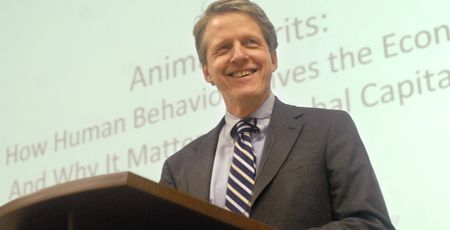Morale Boost Will Improve Global Markets
March 01, 2009

Economist and author Robert Shiller of Yale University delivered the first annual Beattie Family Lecture in Business Law.
By Heather Travis, Western News
All over the world businesses are reacting to the difficult financial climate with layoffs, hiring freezes, and curbed spending habits, all of which are dampening people’s so-called “animal spirits,” says world-renowned economist and author Robert Shiller. Shiller, the Arthur M. Okun Professor of Economics at Yale University, spoke about "Animal Spirits: How Human Psychology caused the Current Economic Crisis” at the recent first Beattie Family Lecture in Business Law.
“Animal spirits, we think, is the big driver of the economy, maybe responsible for most of the fluctuations that we see.”
Shiller admits his perspective is contrary to that of most economists who tie shifts to something more concrete, such as decisions of investment banks. So set aside a lot of the complex financial jargon flooding most newscasts. “We think economies are driven by stories.”
Most people don’t know about large investment banks, such as Bear Stearns and Lehman Brothers, says Shiller. Instead, when “your neighbor just lost his job and they are closing the factory down, there is a switch in your mind that gets turned on that ‘hey these are bad times.’ “When lots of people make that switch, it becomes a self-fulfilling prophecy.”
Heightened financial concern has contributed to world-wide reactions – personal spending restraint, the pulling out of investments and fretting about the economic future. “We just really don’t know the future. There are a lot of people pretending to know the future and they make careers of pretending to do that, but you know they are show people. Nobody knows,” he says.
Noting it is difficult to see a silver lining in the economic downturn and that businesses depend on some estimate of the future, Shiller says the only way to turn the tide is for governments to increase morale.
“Governments are the most important to do that. The problem is they have to do it in a consistent way without over-stimulating optimism.”
He says the Canadian financial climate is similar to the United States because many trade industries, such as the automotive industry, tie the two countries.
Market fluctuations in Canada often mimic what is happening in the U.S. If citizens believe there is an end to the current economic situation, rather than being overwhelmed by the magnitude of it, the communal psyche will improve and the economy will rebound. But individual countries cannot solve this economic problem alone.
“This is a world problem and if any one country tries to deal with the crisis on its own, it can’t do it because the effects will diminish by the international transmission,” he says, adding it may also lead to protectionism.
“I am worried about this crisis and I think we can do something about it,” he says. It will be five to ten years of legal work ahead to fix the regulatory environment and the vulnerability of the economy, he says. “It’s going to take a long time.”
In his bestselling book, “Irrational Exuberance,” an analysis of speculative bubbles, Shiller predicted the peak and collapse of the stock market. The first edition was published in March 2000, the same month the tech stock bubble burst. In the 2005 second edition, Shiller was one of the first to identify a real estate bubble in the U.S. and he predicted it would burst and trigger a financial crisis. He explained the origins of the housing and economic crisis and outlined a plan for recovery in “Subprime Solution: How the Global Financial Crisis Happened and What To Do About It” (2008). His new book, “Animal Spirits: How Human Psychology Drives the Economy, and Why It Matters for Global Capitalism,” co-authored with Nobel Prize winner George Akerlof, was published in March 2009.
The Beattie Family Lecture Series in Business Law was established by Geoff Beattie, LLB ’84, Western’s $500-million volunteer fundraising campaign chair, and deputy chairman of Thomson Reuters and president of The Woodbridge Company Limited.
View excerpts from lecture on YouTube






